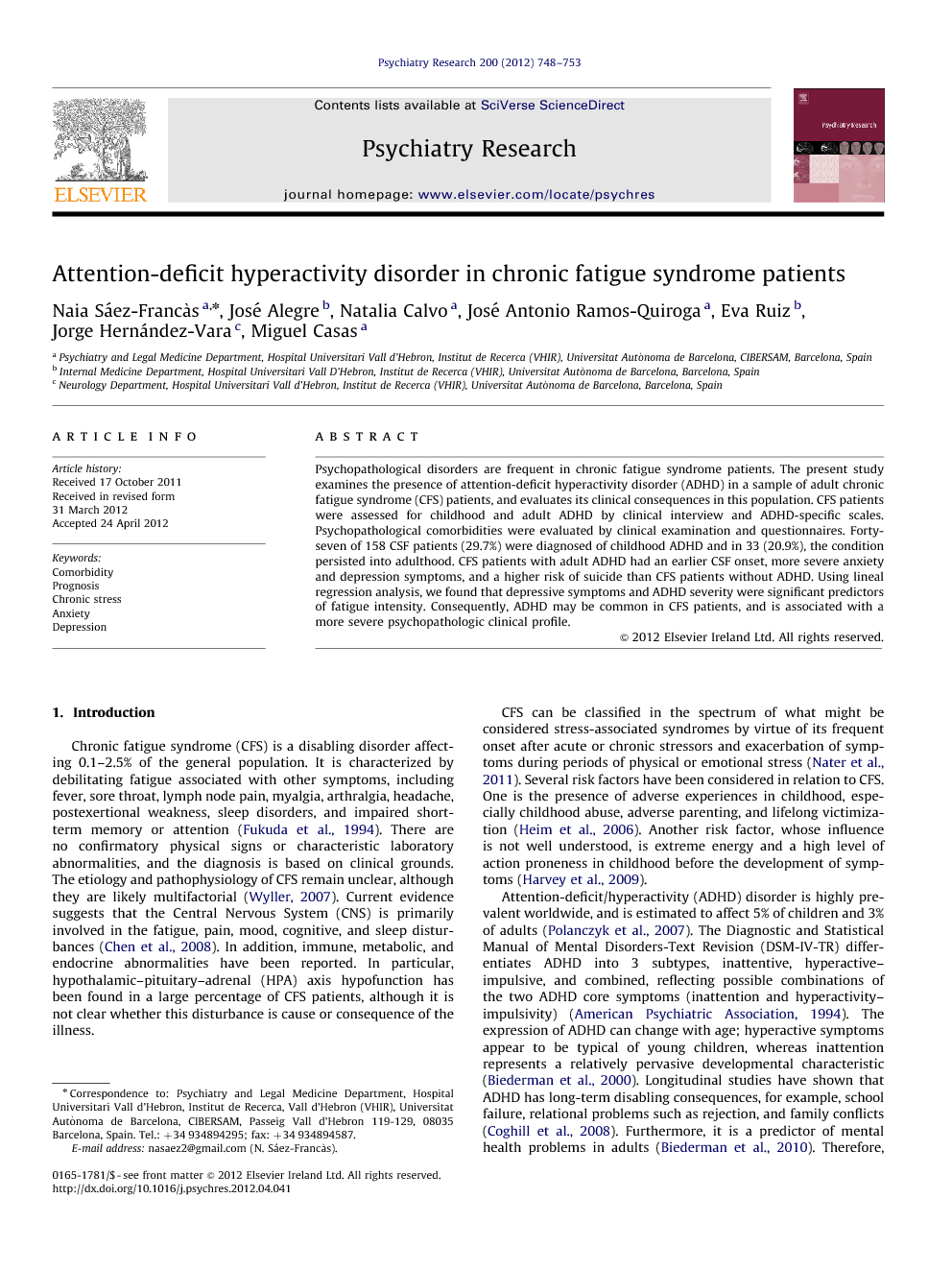Psychopathological disorders are frequent in chronic fatigue syndrome patients. The present study examines the presence of attention-deficit hyperactivity disorder (ADHD) in a sample of adult chronic fatigue syndrome (CFS) patients, and evaluates its clinical consequences in this population. CFS patients were assessed for childhood and adult ADHD by clinical interview and ADHD-specific scales. Psychopathological comorbidities were evaluated by clinical examination and questionnaires. Forty-seven of 158 CSF patients (29.7%) were diagnosed of childhood ADHD and in 33 (20.9%), the condition persisted into adulthood. CFS patients with adult ADHD had an earlier CSF onset, more severe anxiety and depression symptoms, and a higher risk of suicide than CFS patients without ADHD. Using lineal regression analysis, we found that depressive symptoms and ADHD severity were significant predictors of fatigue intensity. Consequently, ADHD may be common in CFS patients, and is associated with a more severe psychopathologic clinical profile.
Chronic fatigue syndrome (CFS) is a disabling disorder affecting 0.1–2.5% of the general population. It is characterized by debilitating fatigue associated with other symptoms, including fever, sore throat, lymph node pain, myalgia, arthralgia, headache, postexertional weakness, sleep disorders, and impaired short-term memory or attention (Fukuda et al., 1994). There are no confirmatory physical signs or characteristic laboratory abnormalities, and the diagnosis is based on clinical grounds. The etiology and pathophysiology of CFS remain unclear, although they are likely multifactorial (Wyller, 2007). Current evidence suggests that the Central Nervous System (CNS) is primarily involved in the fatigue, pain, mood, cognitive, and sleep disturbances (Chen et al., 2008). In addition, immune, metabolic, and endocrine abnormalities have been reported. In particular, hypothalamic–pituitary–adrenal (HPA) axis hypofunction has been found in a large percentage of CFS patients, although it is not clear whether this disturbance is cause or consequence of the illness.
CFS can be classified in the spectrum of what might be considered stress-associated syndromes by virtue of its frequent onset after acute or chronic stressors and exacerbation of symptoms during periods of physical or emotional stress (Nater et al., 2011). Several risk factors have been considered in relation to CFS. One is the presence of adverse experiences in childhood, especially childhood abuse, adverse parenting, and lifelong victimization (Heim et al., 2006). Another risk factor, whose influence is not well understood, is extreme energy and a high level of action proneness in childhood before the development of symptoms (Harvey et al., 2009).
Attention-deficit/hyperactivity (ADHD) disorder is highly prevalent worldwide, and is estimated to affect 5% of children and 3% of adults (Polanczyk et al., 2007). The Diagnostic and Statistical Manual of Mental Disorders-Text Revision (DSM-IV-TR) differentiates ADHD into 3 subtypes, inattentive, hyperactive–impulsive, and combined, reflecting possible combinations of the two ADHD core symptoms (inattention and hyperactivity–impulsivity) (American Psychiatric Association, 1994). The expression of ADHD can change with age; hyperactive symptoms appear to be typical of young children, whereas inattention represents a relatively pervasive developmental characteristic (Biederman et al., 2000). Longitudinal studies have shown that ADHD has long-term disabling consequences, for example, school failure, relational problems such as rejection, and family conflicts (Coghill et al., 2008). Furthermore, it is a predictor of mental health problems in adults (Biederman et al., 2010). Therefore, ADHD is an important childhood stress factor, which in some patients persists into adulthood.
The relationship between the presence of ADHD and later development of CFS has not been formally evaluated. Considering the observation that chronic stress and hyperactive behavior are risk factors for CFS and that ADHD can be associated with these factors, we hypothesized that ADHD could be common in CFS patients.
The primary aim of this study was to evaluate the presence of child and adult attention-deficit hyperactivity disorder in a sample of adult patients with chronic fatigue syndrome, using a cross-sectional study design. The secondary objective was to describe the clinical consequences of this association.


